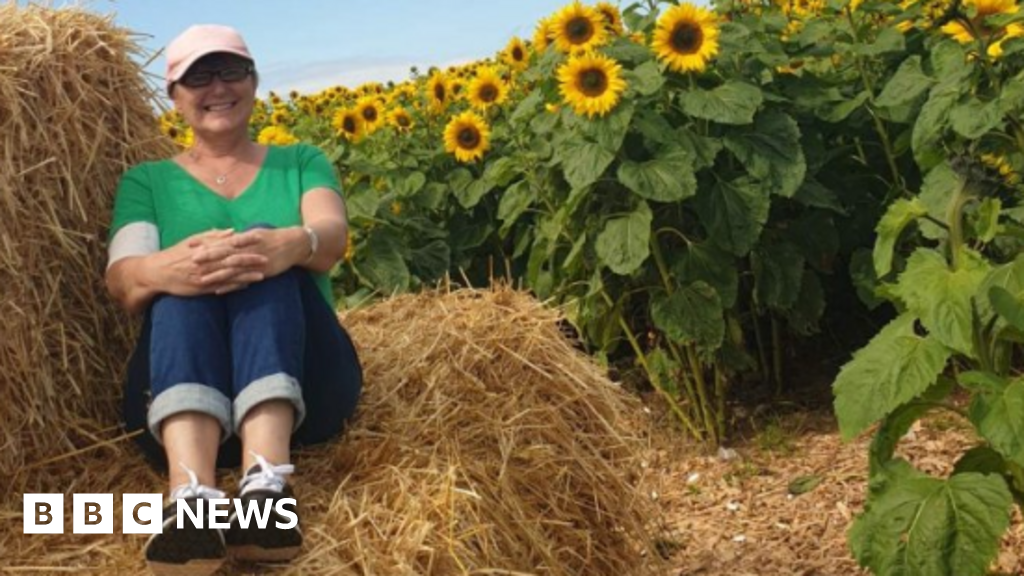Fitness
Ovarian cancer patient hails treatment as a ‘lifeline’ – BBC News

Image source, Christine Campbell
- Author, Aileen Moynagh
- Role, BBC News NI health reporter
A terminally ill woman who has lived longer than doctors predicted has said she has been given a lifeline thanks to a new treatment.
Christine Campbell, from Dundonald was diagnosed with stage-four high-grade ovarian cancer three years ago.
Now, almost a year later, she has started treatment with a drug called Avastin. It has been available in Northern Ireland for a few years but this is Christine’s first time having it prescribed.
Also known as bevacizumab, the drug is a targeted treatment that stops the cancer from growing blood vessels, preventing it from getting bigger.
In 2021, the 58-year-old was experiencing the symptoms of ovarian cancer: bloating, tiredness, loss of appetite.
But the condition went undiagnosed for five months because she said she could not get a face-to-face GP appointment.
Christine was diagnosed as an emergency patient after a red-flagged gynae consultation, which she said “basically saved my life”.
“It took me a long time to change my mindset and go: ‘This is my new normal, this is how my life is going to be going forward.’ And I could choose what I wanted to do with that,” she said.
When Christine was told her cancer was terminal, she said it was as if “somebody slammed me into a wall and all the life, and the breath was knocked out of me”.
“I felt the world was unfair,” she said.
“I’m a mother, I’m a daughter, I’m a sister, I’m a niece, I’m an aunt, I’m Christine. I’m not just cancer.”
So she made the choice to use her voice and became “more determined” to raise awareness around ovarian cancer.
“People don’t have to be in a position of power to make changes, but if I can influence that change in some way, that’s what I will continue to do.”
But she admits to feeling like she’s living on borrowed time.
“There is a joy in getting up every day and being able to do something, but also when you go to bed at night, you think is that a day closer to me running out of time,” she said.
“It is quite difficult to deal with that sometimes.”
When Christine was given her terminal diagnosis, she asked how long she could expect.
“I know it’s a guesstimate.
“I know nothing is ever written in stone and everybody’s cancer journey is unique.
“I always held on to that little bit of hope that I would be the one to buck the trend.”
She added: “I’m very much someone who tries to be positive and have some hope, but there are dark days.”
Image source, Christine Campbell
‘I’ve still things to do’
According to the NI Cancer Registry, on average 200 women are diagnosed with ovarian cancer in Northern Ireland each year.
“Even if I hadn’t got that less than 12 months diagnosis, there was still that ticking time bomb of I probably did have less than five years,” she said.
But Christine is still here and still fighting.
She does “think of timeframes” when it comes to something as innocuous as buying theatre tickets for the coming months but that doesn’t stop her mapping out things to enjoy with family and friends – even if it’s not too far ahead.
“Some might say I’m stubborn, but I just feel determined and I’ve still things to do,” she added.
“For quite a while, I was afraid to look to the future. I don’t mean five or 10 years down the line. The future to me was a month or two down the line.
“Now I’ve put that aside, because it allows me to live and to get on with my life as best I can.”
Side effects of ovarian cancer treatment
Christine’s new Avastin treatment began at the start of June. It was not available to her when she was diagnosed last year.
She said she’s hopeful but also anxious about potential side effects.
“Some of them can be quite serious, but I’m willing to take that risk at this moment in time.
“It still allows me some element of control over my treatment as well, because if I feel that I can’t tolerate the treatment, I then have to look at do I want quality of life over quantity of life.
“Again, that’s a very difficult decision to make.”
This treatment will potentially give Christine more time and she is holding on to that hope. After surpassing her last prognosis, she hasn’t been given another one – and she’s content with that.
“The not knowing this time what the final diagnosis will be let’s me concentrate on being me, doing things that I enjoy and not putting things off,” she said.
And part of being Christine, she said, is advocating for all those with ovarian cancer for as long as she can.
What are the symptoms of ovarian cancer?
Symptoms of ovarian cancer include frequently (roughly 12 or more times a month) having:
- Persistent bloating
- Pelvic or abdominal pain
- Feeling full quickly and/or loss of appetite
- Urinary symptoms
Other symptoms of ovarian cancer can include:
- indigestion
- constipation or diarrhoea
- back pain
- feeling tired all the time
- losing weight without trying
- bleeding from the vagina after the menopause


)






